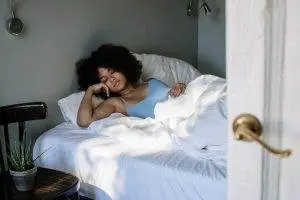By Qineng Tan, L.Ac., Ph.D. & Xiaomei Cai, L.Ac., Ph.D.

Signs of depression as winter approaches? Seasonal Affective Disorder (SAD) is a form of depression, with some similarities to bi polar disorder, that recurs at a certain time of year. Sometimes called seasonal depression, or “the winter blues,” SAD symptoms typically peak during the darkest months. Acupuncture and TCM can provide relief from Seasonal Affective Disorder symptoms, including depression and anxiety, insomnia, and fatigue.
SAD is a form of mental illness that affects 5-10% of the population every year. Women are more likely to experience seasonal depression symptoms than men, and this depressive disorder is more common in young adults than other age groups. However, anyone, at any age, can experience some symptoms of seasonal affective disorder.
People who live in colder climates, farther away from the earth’s equator, are statistically much more likely to have SAD than people who live in warmer areas. It is generally believed that shorter periods of daytime sunlight are a big part of what causes seasonal affective disorder. People who work indoors, or at night, are considered to be at a higher risk for developing SAD, because they aren’t exposed to daylight.
Often, signs of SAD begin to appear in late fall, and then worsen as the days get shorter and the winter months drag on. The symptoms of depression then go away as the days get longer, and spring starts. It is possible, though, for some people to have a type of seasonal depression that comes on in the summer, or any time of year.
Mental health professionals consider SAD to be a specific type of bi polar disorder, or form clinical depression. Winter pattern SAD, or winter depression, is more common, but some people exhibit summer pattern SAD, or summer depression. A doctor will diagnose seasonal affective disorder with the same criteria they use for diagnosing major depression, when the symptoms have appeared at the same time for two or more consecutive years.
People may be more susceptible to SAD if they already suffer from other psychological disorders, like panic attacks, anxiety, PTSD, eating disorders, or ADHD, or if other people in their family also suffer from depression.
While medical science has not definitively proven what causes SAD, it is believed to be related to lower levels of serotonin and/or higher levels of melatonin. Imbalances in these brain chemicals can lead to the lethargic feelings and depressed mood that characterizes seasonal depression, which can have a dramatic impact on your ability to take part in your normal daily activities for four to five months out of the year.
Less daylight can also affect Vitamin D levels, as we normally get some of our Vitamin D from direct exposure to sunlight. The combination of the time change due to daylight savings time, and the shorter days, can have a major impact on your daily rhythms, and some people have a harder time making this adjustment.
When you are already feeling moody, anxious, or depressed, facing holiday events with your family or other people can feel overwhelming. Feelings of loneliness and sadness can make you feel isolated and unable to enjoy things that seem to be making others so happy. Changes in your appetite can lead to overeating unhealthy foods and weight gain, and you may feel triggered and self-conscious about your body.
TCM can be a highly effective way to treat all types of depression and anxiety, as it approaches mental health disorders holistically. Finding the root cause of emotional and physical symptoms from the TCM point of view can help relieve sleep problems and mood disorders, and help to restimulate mental clarity and a healthy appetite.
Top 10 SAD Symptoms

Naturally, most people feel some alteration in their mood and energy as the seasons change. Shorter days, longer nights, and colder temperatures are bound to have an effect on your mood and behavior. But, if you begin feeling persistently low, and notice that it is affecting your sleeping and eating habits, then you may need to pay closer attention to the possibility of seasonal depression. Symptoms of seasonal affective disorder include:
- Depression, depressed mood, sadness, feeling low
- Fatigue, lack of energy, low energy, tired all the time
- Sleep problems, insomnia, poor sleep, oversleeping
- Irritability, agitation, anxiety
- Changes in appetite, cravings for carbohydrates and/or sugar, or lack of appetite
- Weight gain or weight loss
- Lack of interest in activities you usually enjoy
- Difficulty concentrating, foggy headed
- Feelings of worthlessness, futility, guilt
- Dark feelings, thoughts of death, suicidal thoughts, suicidal ideation
Sometimes people show behavioral changes that are an indication of SAD. For some people, this might be an increase in repetitive motions, like pacing, hand-wringing, or general restlessness. For others, it may mean that their overall manner and mode of movement slows down and becomes sluggish. They have a hard time getting out of bed or off the couch; when they do, they may shuffle, slowly, and their posture is hunched over. People may avoid socializing and isolate themselves. They may have a low libido.
When people have winter-pattern SAD, the symptoms tend to lean towards depression, heaviness, oversleeping, overeating, and weight gain. Summer-pattern SAD may induce feelings of anxiety, agitation, lack of appetite, insomnia, irritability, and even anger and violent episodes.
Treatment for Seasonal Affective Disorder (SAD)
If you seek medical help for seasonal affective disorder, you may be prescribed antidepressant medications, such as SSRIs. SSRIs (like Prozac, Lexapro, Zoloft or Celexa) help to elevate the levels of serotonin in the brain. Bupropion (Wellbutrin) is also used to help relieve symptoms of SAD by increasing serotonin and dopamine. Benzodiazepine (Xanax), which is generally used to help anxiety, may also be prescribed to help seasonal depression.
These medications can all have some negative side effects, and people may feel dependent on them, even when their SAD might naturally be abating.
Talk therapy and cognitive behavioral therapy can help people cope with their feelings and find ways to manage their behavior so that their health doesn’t suffer during the months they are having SAD symptoms.
Light therapy is now considered a viable way to treat SAD. This involves buying and using a special lamp to simulate sunlight. This can be helpful for some people, but for others, it can cause sleeplessness, eye strain, and headaches. People who have diabetes or eye problems should probably not use a light box because it could cause damage to the retina of the eye. People who take certain kinds of anti-inflammatory medications or antibiotics can also be more sensitive to light. The light can also trigger manic episodes in people who already have bipolar disorder.
Acupuncture and TCM herbs offer a very safe way to relieve symptoms of depression and anxiety, without unwanted side effects.
Can Acupuncture Help SAD or Seasonal Depression?

In the practice of TCM, we pay close attention to the way the seasons impact our health, as our bodies and minds reflect the transformation of the world around us. Winter and Summer are times when the energy in our environment can feel the most dramatic, and the feelings these times inspire in us can go deep. Extreme heat and cold definitely have an effect on our bodies, and being surrounded by darkness or intense brightness can have a real impact on our mental outlook.
The Five Elements theory in TCM gives us a framework for understanding how temperatures, light and colors, and other aspects of seasonal changes affect and interplay with the organ systems of the body. The Liver, for example, is considered to be responsible for moving Qi through the body. If the Liver Qi is stagnant and slow, it can lead to very real feelings of frustration and ultimately, depression. The Kidney is associated with sun energy, so lack of sunlight can lead to feeling cold and sad.
It is possible to balance this energy within ourselves, so that we can experience the seasons without harm to our physical or mental health. By using specific acupuncture points, we can help to nourish and strengthen the energy in the organ systems. We can also use acupressure points and herbs to help promote better sleep, relieve fatigue, restlessness, and irritability.
Top Tips from TCM to Help Prevent Seasonal Affective Disorder

Making changes to your lifestyle is essential in order to banish the winter blues. It is easy to get trapped in a cycle of unhealthy eating and sleeping behaviors, and it may take some effort to get back on track. To avoid sluggish energy and loss of fitness, make it your goal to adopt these daily habits:
- Eat More Nourishing, Warm Foods – Many people crave sweets and starchy foods during the winter months, but the combination of eating too many carbohydrates and not getting enough exercise can lead to weight gain. This will likely add to feelings of heaviness and depression. According to the TCM philosophy of nutrition, we want to concentrate on eating more warming foods like soups and stews with lots of vegetables, including hearty, filling foods like sweet potatoes and winter squashes. Add sour flavor and probiotics with fermented foods like pickled cabbage.
- Avoid Cold Foods and Drinks – Now it is especially important to avoid cold foods like iced treats, smoothies, or raw salads. Eating too much sugar or drinking alcohol, especially in the evening, can cause blood sugar levels to rise and then fall, which can cause you to wake up in the night.
- Exercise in the Morning Light – A brisk walk around the neighborhood or a short hike in the fresh air is ideal. You want to get your heart pumping and take in as much sunlight as you can in the early part of the day.
- Get Some Sun – Take every opportunity to sit by a window. If this is not possible, keep your work and home space well lit during the daytime, so that you don’t get drowsy. Go for one more walk in the afternoon to catch the sunset, if you can.
- Adjust Your Sleep Cycle – Go to bed earlier, and wake with the sun. It is natural that we want more rest and time in our cozy, warm beds in the winter. Avoid staying up in the darkness with the unnatural light from your screens shining in your eyes before bedtime. Wind down with a warm drink and a self-care foot massage.
Acupuncture Near Me for SAD and Seasonal Depression – Los Angeles Area
Acupuncture and TCM are now widely accepted as effective treatments for mental health issues and psychological disorders of all kinds: depression, anxiety, PTSD, panic disorder. A TCM practitioner will listen carefully to all of the physical and emotional symptoms each individual presents, and structure each acupuncture treatment and herbal formula accordingly. Thus, as the seasons change, and you go through life changes, your treatment plan changes, too. To avoid Seasonal Affective Disorder, it is best to see your acupuncturist a few months before the difficult season will arrive, so that this year, you can prevent seasonal depression from coming on.
*This article is for education from the perspective of Traditional Chinese Medicine only. The education provided by this article is not approved by FDA to diagnose, prevent, treat and cure human diseases. It should not stop you from consulting with your physician for your medical conditions. Traditional Chinese Medicine is based on Qi, which is an invisible force that usually cannot be observed by modern science. Because science focuses on testing ideas about the natural world with evidence obtained through observation, these aspects of acupuncture can’t be studied by science. Therefore acupuncture and Chinese herbs are often not supported by double-blind, randomized trials, and they are considered alternative medicine therapies in the United States.
